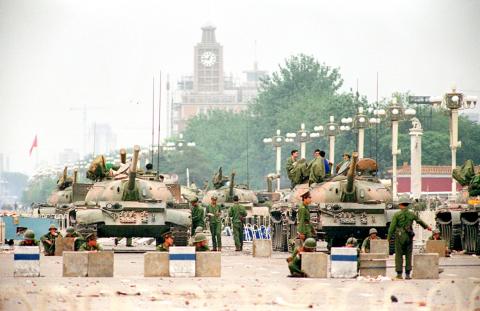It has been three months since Chinese rock musician Li Zhi (李志) disappeared from public view.
First, an upcoming tour was canceled and his social media accounts were taken down. Then his music was removed from all of China’s major streaming sites — as if his career had never existed at all.
Li is an outspoken artist who performs folk rock. He sang pensive ballads about social ills and unlike most entertainers in China, dared to broach the taboo subject of the Tiananmen Square pro-democracy protests that ended in bloodshed on June 4, 1989.

Photo taken from the Internet
“Now this square is my grave,” Li sang. “Everything is just a dream.”
The Chinese Communist Party has pushed people like Li into the shadows as it braces for tomorrow’s 30th anniversary of the military crackdown. Hundreds, if not thousands, are estimated to have died.
The party’s effort to scrub any mention of the movement has been consistent through the decades since then and ramps up before major anniversaries every five years. This year, a trade dispute with the US has added to Chinese government skittishness about instability.

Photo: AFP
“They are certainly nervous,” said Jean-Pierre Cabestan, a professor of political science at Hong Kong Baptist University. “Under [Chinese President] Xi Jinping [習近平], no stone will be left unturned.”
Many of the actions appear aimed at eliminating any risk of individuals speaking out, however small their platforms.
Bilibili, a Chinese video streaming site, last week announced that its popular real-time comments feature would be disabled until June 6 for “system upgrades.”
Chinese Human Rights Defenders, an advocacy group, said that 13 people have either been detained or taken away from their homes in connection with the anniversary. Among them are several artists who recently embarked on a “national conscience exhibit tour” and a filmmaker who was detained after tweeting images of a liquor bottle commemorating June 4.
The bottle’s label featured a play on words using “baijiu” (白酒), China’s signature grain alcohol, and the Chinese words for 89, or “bajiu” (八九). A court convicted four people involved in designing the bottle.
Foreign companies are not immune. Apple Music has removed from its Chinese streaming service a song by Hong Kong singer Jacky Cheung (張學友) that references the Tiananmen crackdown. Tat Ming Pair, a Hong Kong duo of composer Tats Lau (劉以達) and vocalist Anthony Wong (黃耀明), have been deleted entirely from the app. They released a song this month called Remembering is a Crime in memory of the protests.
Wikipedia also announced last month that the online encyclopedia is no longer accessible in China.
While the Chinese-language version has been blocked since 2015, most other languages could previously be viewed, Wikipedia said.
The disappearance of Li has left fans searching for answers.
On Feb. 20, an official social media account for the 40-year-old’s concert tour posted a photograph of its team in front of a truck about to embark on scheduled performances in Sichuan Province.
However, just two days later the account posted an image of a hand wearing what appeared to be a hospital wrist band and the words: “Very sorry.”
The next post, published the same day, announced without explanation that the tour was canceled and that ticket purchasers would shortly receive a refund. Fans flooded the comment section with wishes for a speedy recovery.
However, the suggestion that a health issue was behind the cancelations was later thrown into doubt.
A statement published in April by the Sichuan Department of Culture said it had “urgently halted” concert plans for a “well-known singer with improper conduct” who was previously slated for 23 performances — the same number of concerts that Li had scheduled in the province.
It said that 18,000 tickets were fully refunded.
At about the same time, Li’s presence on the Chinese Internet was completely erased. An April 21 central government directive ordered all Web sites to delete any audio or video content relating to five of Li’s songs, according to China Digital Times, an organization that publishes leaked censorship instructions.
Reporters could not independently verify the authenticity of the directive.
“There’s pretty much a consensus” among those working in the industry that Li’s disappearance from public view is due to the sensitive anniversary, said a music industry professional who spoke on condition of anonymity because of fear of government retribution.
“He did a number of songs that were considered politically risky, making references to June 4, 1989, and so he’s been out of the picture,” the industry professional said.
Li’s songs alluding to the Tiananmen Square protests — The Square, The Spring of 1990 and The Goddess, in honor of a monument to democracy that protesters erected — were part of his earlier works. In recent years, the bespectacled singer has avoided making public political statements, focusing more on promoting his performances.
In 2015, the state-run China Daily published a profile of Li, describing him as a performer who easily sells out concerts. After years of working as an independent artist, he signed last year with Taihe Music Group, a major Chinese record label.
Fans who knew Li as a largely apolitical entertainer expressed bewilderment online about his disappearance. Others made veiled references to China’s Internet censorship.
A fan who has been sharing Li’s music on his personal account spoke to reporters on condition of anonymity because he feared that his employers would punish him for discussing the subject.
“Everyone knows the reason for Li Zhi’s disappearance, but I’m sorry, I can’t tell you, because I follow China’s laws and also hope that Li Zhi can return,” the fan said.
Quoting one of Li’s lyrics, the fan added: “The world will be all right.”
Fans continue to circulate videos of Li’s performances online. His complete discography has been uploaded onto file-sharing Web sites, with back-up links in case the original ones are shuttered. Some users shared tribute art, including a black T-shirt with the words “improper conduct.”
A few years ago, in a performance in Taiwan, Li bounced around on stage, strumming his guitar and repeating a chorus in apparent tribute to the spirit of Chinese propaganda.
“The people don’t need freedom,” he sang energetically.
“This is the best era,” the crowd roared back. “The people don’t need freedom. This is the best era.”

LANDMARK CASE: ‘Every night we were dragged to US soldiers and sexually abused. Every week we were forced to undergo venereal disease tests,’ a victim said More than 100 South Korean women who were forced to work as prostitutes for US soldiers stationed in the country have filed a landmark lawsuit accusing Washington of abuse, their lawyers said yesterday. Historians and activists say tens of thousands of South Korean women worked for state-sanctioned brothels from the 1950s to 1980s, serving US troops stationed in country to protect the South from North Korea. In 2022, South Korea’s top court ruled that the government had illegally “established, managed and operated” such brothels for the US military, ordering it to pay about 120 plaintiffs compensation. Last week, 117 victims

China on Monday announced its first ever sanctions against an individual Japanese lawmaker, targeting China-born Hei Seki for “spreading fallacies” on issues such as Taiwan, Hong Kong and disputed islands, prompting a protest from Tokyo. Beijing has an ongoing spat with Tokyo over islands in the East China Sea claimed by both countries, and considers foreign criticism on sensitive political topics to be acts of interference. Seki, a naturalised Japanese citizen, “spread false information, colluded with Japanese anti-China forces, and wantonly attacked and smeared China”, foreign ministry spokesman Lin Jian told reporters on Monday. “For his own selfish interests, (Seki)

Argentine President Javier Milei on Sunday vowed to “accelerate” his libertarian reforms after a crushing defeat in Buenos Aires provincial elections. The 54-year-old economist has slashed public spending, dismissed tens of thousands of public employees and led a major deregulation drive since taking office in December 2023. He acknowledged his party’s “clear defeat” by the center-left Peronist movement in the elections to the legislature of Buenos Aires province, the country’s economic powerhouse. A deflated-sounding Milei admitted to unspecified “mistakes” which he vowed to “correct,” but said he would not be swayed “one millimeter” from his reform agenda. “We will deepen and accelerate it,” he

Japan yesterday heralded the coming-of-age of Japanese Prince Hisahito with an elaborate ceremony at the Imperial Palace, where a succession crisis is brewing. The nephew of Japanese Emperor Naruhito, Hisahito received a black silk-and-lacquer crown at the ceremony, which marks the beginning of his royal adult life. “Thank you very much for bestowing the crown today at the coming-of-age ceremony,” Hisahito said. “I will fulfill my duties, being aware of my responsibilities as an adult member of the imperial family.” Although the emperor has a daughter — Princess Aiko — the 23-year-old has been sidelined by the royal family’s male-only